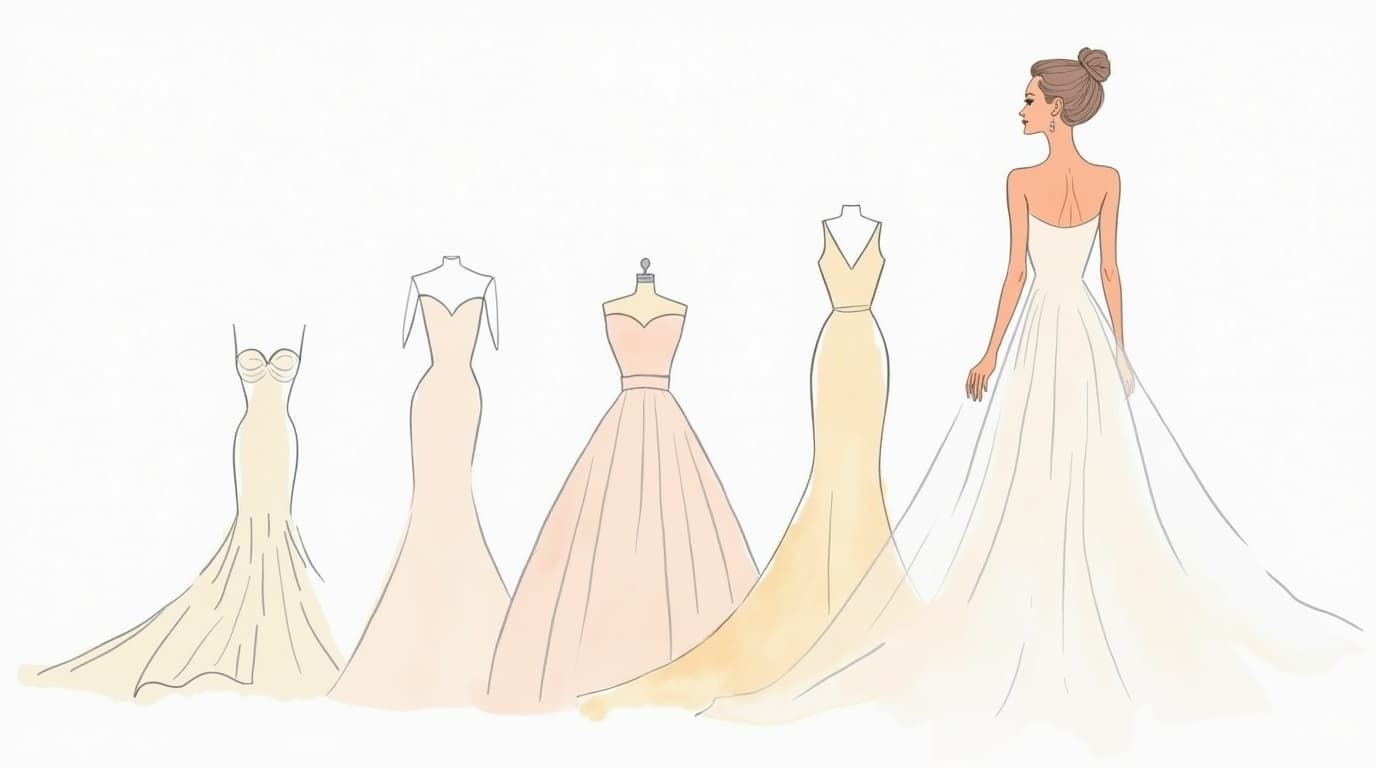Understanding Wedding Dress Silhouettes

In bridal fashion, a "silhouette" is the entire shape or silhouette of a bridal gown side-on. It essentially controls the general shape of the dress and the way it curves, enhances, or restructures the natural shape of the body. Fabric, ornamentation, and color establish the personality of the dress, while silhouette sets the architectural form of the dress.The silhouette is the primary organizing principle for categorizing wedding dress styles. Major silhouette categories include:
| A-line | Fitted at the bodice and gradually widening to the hem, creating an "A" shape |
| Ball gown | Fitted bodice with a dramatically full skirt that extends outward from the waist |
| Mermaid | Closely contoured through the bodice, hips, and thighs before flaring out at or below the knee |
| Trumpet | Similar to mermaid but begins to flare at mid-thigh for slightly more mobility |
| Sheath/Column | Follows the natural line of the body without significant flaring |
| Empire | Features a high waistline just below the bust with a flowing skirt |
| Fit-and-flare | Fitted through the bodice and hips, then flares above the knee |
| Asymmetrical | Features uneven hemlines or design elements |
| Drop waist | Waistline sits lower than natural waist, often at hip level |
| High-low | Shorter in front, longer in back |
| Jumpsuit | One-piece garment with pants rather than a skirt |
| Mini | Hem falls above the knee |
| Modified A-line | A slightly more fitted variation of the traditional A-line |
| Modified ball gown | Often less voluminous than a traditional ball gown |
| Modified mermaid | A softer version of the mermaid with a more gradual flare |
| Pantsuits | Sophisticated two-piece outfit with pants |
| Separates | Two-piece ensembles with mix-and-match tops and skirts |
| Tea length | Hem falls between knee and ankle |
| Two-piece | Similar to separates, featuring distinct top and bottom components |
| Watteau | Features a cape-like train that attaches at the shoulders |
Careful Silhouette Selection Is Crucial
The silhouette is arguably the most significant factor in the selection of wedding dresses for several reasons. Firstly, it greatly affects how the bride's figure appears. Different silhouettes emphasize or hide some parts of the body—a ball gown might emphasize a waist but minimize hips, while mermaid emphasizes intentionally.
Second, the silhouette impacts functional concerns like comfort and mobility. A bride choosing a cathedral ceremony with seated dinner reception might make a different choice than one who is having a beach ceremony with dancing under the stars. The amount of fabric, weight, and how easily she can move vary significantly between silhouettes.
Third, silhouette also tends to connect with the overall wedding appearance and venue. A formal ballroom wedding might call for the drama of a ball gown or mermaid silhouette, while a garden wedding might be matched with the romantic flow of an empire or A-line silhouette.
Create Your Visual Impact
Most importantly, silhouette creates the immediate visual impact of the bride. It is generally the first to be seen from a distance and frames the way all other design elements are perceived. Even before details like beading or lace patterns can be seen, the silhouette prepares the ground for the presence and establishment of the gown.
When brides begin the selection process, experienced consultants often recommend trying different silhouettes early in the appointment, even those the bride might not have initially considered. This approach helps identify which fundamental shapes most flatter and appeal to the bride before narrowing down specific design elements.
While trends in details and embellishments may shift seasonally, silhouettes represent more enduring style categories in bridal fashion, with each carrying distinct associations and advantages that remain relatively consistent through changing fashion eras.
Start your selection process here. We can create a perfect dress shortlist from thousands of options.